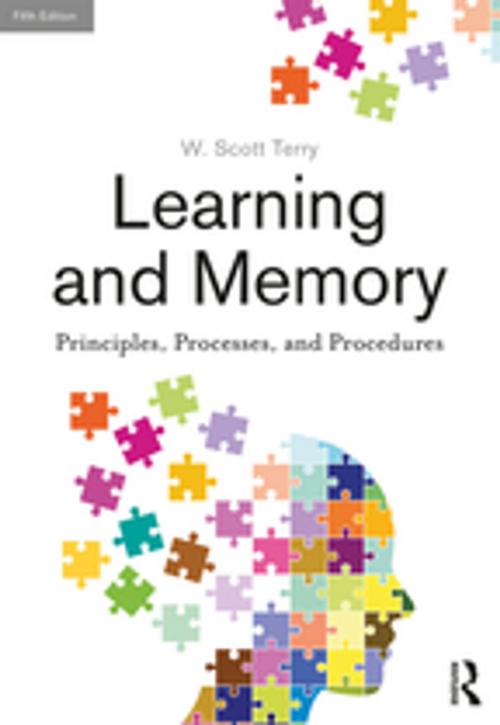Learning and Memory
Basic Principles, Processes, and Procedures, Fifth Edition
Nonfiction, Health & Well Being, Psychology, Cognitive Psychology, Reference & Language, Education & Teaching, Educational Theory| Author: | W. Scott Terry | ISBN: | 9781317224044 |
| Publisher: | Taylor and Francis | Publication: | October 16, 2017 |
| Imprint: | Routledge | Language: | English |
| Author: | W. Scott Terry |
| ISBN: | 9781317224044 |
| Publisher: | Taylor and Francis |
| Publication: | October 16, 2017 |
| Imprint: | Routledge |
| Language: | English |
This thoroughly updated edition provides a balanced review of the core methods and the latest research on animal learning and human memory. The relevance of basic principles is highlighted throughout via everyday examples to ignite student interest, along with more traditional examples from human and animal laboratory studies. Individual differences in age, gender, learning style, cultural background, or special abilities (such as the math gifted) are highlighted within each chapter to help students see how the principles may be generalized to other subject populations.
The basic processes of learning – such as classical and instrumental conditioning and encoding and storage in long-term memory in addition to implicit memory, spatial learning, and remembering in the world outside the laboratory – are reviewed. The general rules of learning are described along with the exceptions, limitations, and best applications of these rules. The relationship between the fields of neuropsychology and learning and memory is stressed throughout.
The relevance of this research to other disciplines is reflected in the tone of the writing and is demonstrated through a variety of examples from education, neuropsychology, rehabilitation, psychiatry, nursing and medicine, I/O and consumer psychology, and animal behavior.
Each chapter begins with an outline and concludes with a detailed summary. A website for instructors and students accompanies the book.
Updated throughout with new research findings and examples the new edition features:
- A streamlined presentation for today’s busy students. As in the past, the author supports each concept with a research example and real-life application, but the duplicate example or application now appears on the website so instructors can use the additional material to illustrate the concepts in class.
- Expanded coverage of neuroscience that reflects the current research of the field including aversive conditioning (Ch. 5) and animal working memory (Ch. 8).
- More examples of research on student learning that use the same variables discussed in the chapter, but applies them in a classroom or student’s study environment. This includes research that applies encoding techniques to student learning, for example: studying: recommendations from experts (Ch. 1); the benefits of testing (Ch. 9); and Joshua Foer’s Moonwalking with Einstein, on his quest to become a memory expert (Ch. 6).
- More coverage of unconscious learning and knowledge (Ch. 11).
- Increased coverage of reinforcement and addiction (Ch. 4), causal and language learning (Ch. 6), working memory (WM) and the effects of training on WM, and the comparative evolution of WM in different species (Ch. 8), and genetics and learning (Ch. 12).
This thoroughly updated edition provides a balanced review of the core methods and the latest research on animal learning and human memory. The relevance of basic principles is highlighted throughout via everyday examples to ignite student interest, along with more traditional examples from human and animal laboratory studies. Individual differences in age, gender, learning style, cultural background, or special abilities (such as the math gifted) are highlighted within each chapter to help students see how the principles may be generalized to other subject populations.
The basic processes of learning – such as classical and instrumental conditioning and encoding and storage in long-term memory in addition to implicit memory, spatial learning, and remembering in the world outside the laboratory – are reviewed. The general rules of learning are described along with the exceptions, limitations, and best applications of these rules. The relationship between the fields of neuropsychology and learning and memory is stressed throughout.
The relevance of this research to other disciplines is reflected in the tone of the writing and is demonstrated through a variety of examples from education, neuropsychology, rehabilitation, psychiatry, nursing and medicine, I/O and consumer psychology, and animal behavior.
Each chapter begins with an outline and concludes with a detailed summary. A website for instructors and students accompanies the book.
Updated throughout with new research findings and examples the new edition features:
- A streamlined presentation for today’s busy students. As in the past, the author supports each concept with a research example and real-life application, but the duplicate example or application now appears on the website so instructors can use the additional material to illustrate the concepts in class.
- Expanded coverage of neuroscience that reflects the current research of the field including aversive conditioning (Ch. 5) and animal working memory (Ch. 8).
- More examples of research on student learning that use the same variables discussed in the chapter, but applies them in a classroom or student’s study environment. This includes research that applies encoding techniques to student learning, for example: studying: recommendations from experts (Ch. 1); the benefits of testing (Ch. 9); and Joshua Foer’s Moonwalking with Einstein, on his quest to become a memory expert (Ch. 6).
- More coverage of unconscious learning and knowledge (Ch. 11).
- Increased coverage of reinforcement and addiction (Ch. 4), causal and language learning (Ch. 6), working memory (WM) and the effects of training on WM, and the comparative evolution of WM in different species (Ch. 8), and genetics and learning (Ch. 12).















